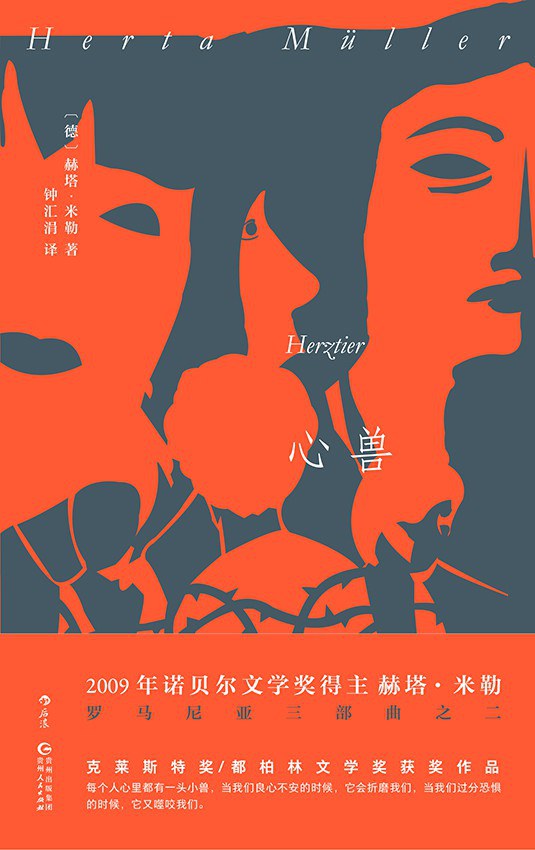1
/
of
1
Beast in the Heart
Beast in the Heart
[Germany] Herta Müller Zhong Huijuan 译
Regular price
$16.99 USD
Regular price
$16.99 USD
Sale price
$16.99 USD
Unit price
/
per
Low stock
Couldn't load pickup availability
About Book
About Book
The second volume of Herta Müller's Romanian trilogy, winner of the 2009 Nobel Prize in Literature and winner of the Kleist and Dublin Prizes, tells the story of a girl's adventure and tragedy in escaping the shadow of power. Synopsis: Lola, a college student from a poor rural village, sells her body to attend university in a big city, but is suddenly found dead in her dormitory. The protagonist and several of her classmates attempt to uncover the truth behind Lola's death, but the shadow of Ceausescu's totalitarian regime makes their search fraught with uncertainty and the constant presence of violence. The allegorical phrase "the beast within"—the "inner beast"—is revealed to the protagonist by her singing grandmother and permeates the book.
♝Editor's Recommendation◎ Herta Müller, winner of the 2009 Nobel Prize in Literature, was born in a German-speaking village in Romania. She depicts the plight of displaced people with the conciseness of poetry and the straightforwardness of prose, and through the silent act of writing, she gives dignity to the weak.
◎ "The Beast Within" was published in 1994 and won the Kleist Prize, a major award in German literature. In 1998, it defeated Margaret Atwood's "Alias Grace" to win the International Dublin Literary Prize.
◎ Young girl Laura moves from a small village to the city to attend university, but the bleak reality crushes her. This is the story of a woman's journey from full of hope to gradually losing it.
Miller's rich, sharp, and captivating imagery captures the surreal beauty and plight of Ceausescu-era Romania.
—The Boston Review of Books
Herta Müller's strength lies in her honesty, and The Beast Within is her testimony. ... It accurately depicts the details of Romanian life.
—The Boston Post
The author's style is spare yet powerful, and the characters are powerful. This quietly told book is at once grim and beautiful, humorous and bitter.
— Dublin Literary Award Citation ♝ 2009 Nobel Prize in Literature "She focuses on the conciseness of poetry and the directness of prose, depicting the life landscape of the people living in the dispossessed."
But to ensure our own existence, we still need these objects, these gestures, these words. After all, the more words we can master, the freer we are. Even if our mouths are silenced, we can still try to assert our rights through gestures and even objects. They are more difficult for censors to decipher, taking time to alert them. And in that long period of time, they transform the humiliation we suffer into another form of dignity.
——Nobel Prize in Literature Acceptance Speech
♝Editor's Recommendation◎ Herta Müller, winner of the 2009 Nobel Prize in Literature, was born in a German-speaking village in Romania. She depicts the plight of displaced people with the conciseness of poetry and the straightforwardness of prose, and through the silent act of writing, she gives dignity to the weak.
◎ "The Beast Within" was published in 1994 and won the Kleist Prize, a major award in German literature. In 1998, it defeated Margaret Atwood's "Alias Grace" to win the International Dublin Literary Prize.
◎ Young girl Laura moves from a small village to the city to attend university, but the bleak reality crushes her. This is the story of a woman's journey from full of hope to gradually losing it.
Miller's rich, sharp, and captivating imagery captures the surreal beauty and plight of Ceausescu-era Romania.
—The Boston Review of Books
Herta Müller's strength lies in her honesty, and The Beast Within is her testimony. ... It accurately depicts the details of Romanian life.
—The Boston Post
The author's style is spare yet powerful, and the characters are powerful. This quietly told book is at once grim and beautiful, humorous and bitter.
— Dublin Literary Award Citation ♝ 2009 Nobel Prize in Literature "She focuses on the conciseness of poetry and the directness of prose, depicting the life landscape of the people living in the dispossessed."
But to ensure our own existence, we still need these objects, these gestures, these words. After all, the more words we can master, the freer we are. Even if our mouths are silenced, we can still try to assert our rights through gestures and even objects. They are more difficult for censors to decipher, taking time to alert them. And in that long period of time, they transform the humiliation we suffer into another form of dignity.
——Nobel Prize in Literature Acceptance Speech
Publication Date
Publication Date
2021-03-01
Publisher
Publisher
贵州人民出版社
Imprint
Imprint
Houlang, Houlang Literature
Pages
Pages
280
ISBN
ISBN
9787221161789
share

